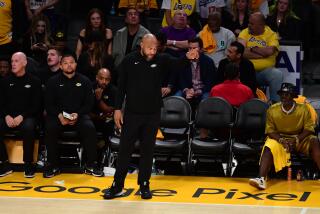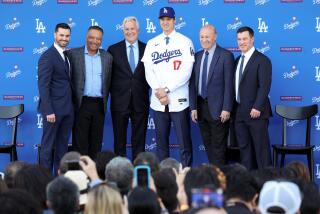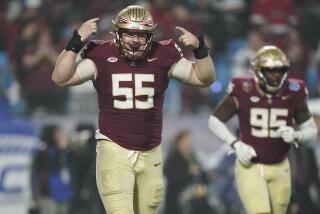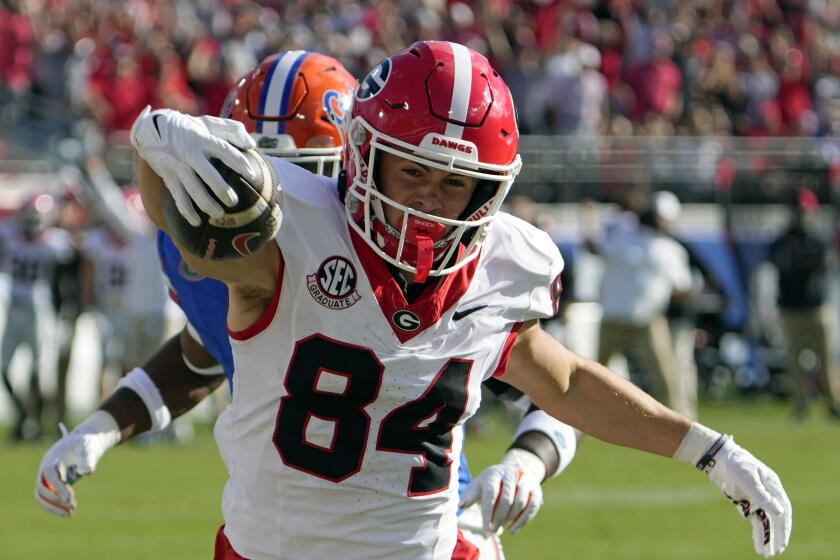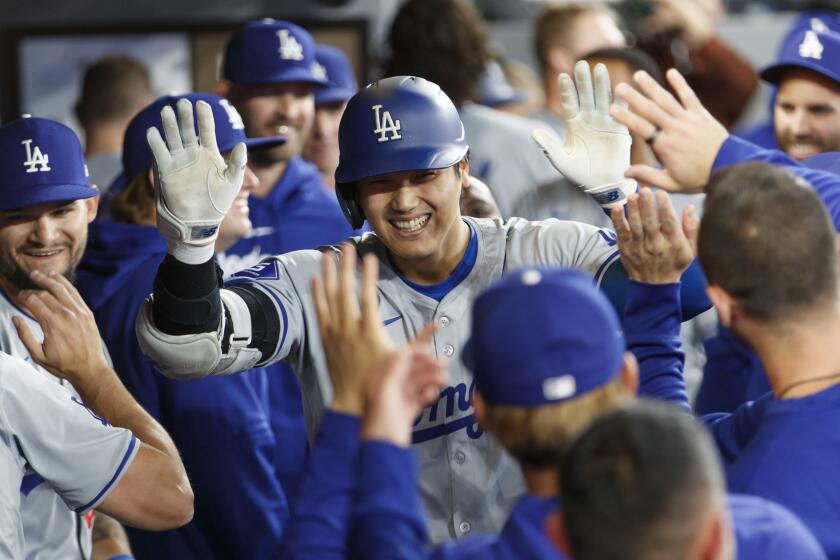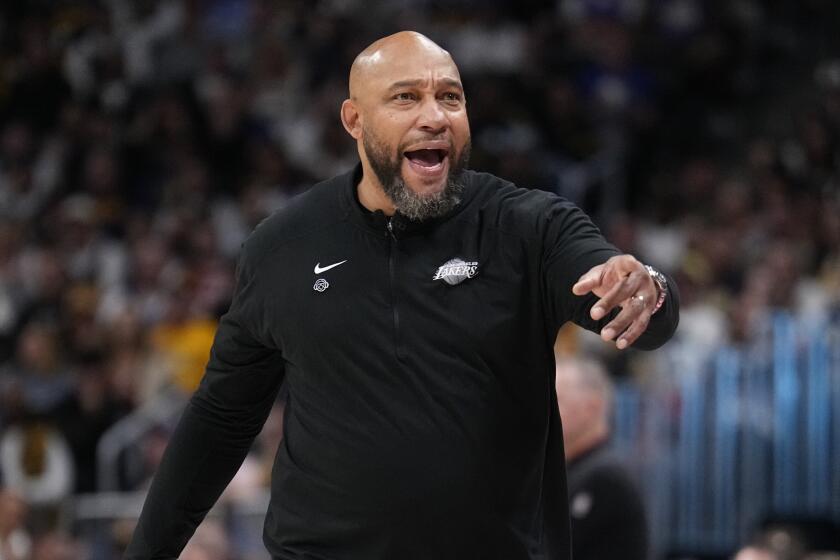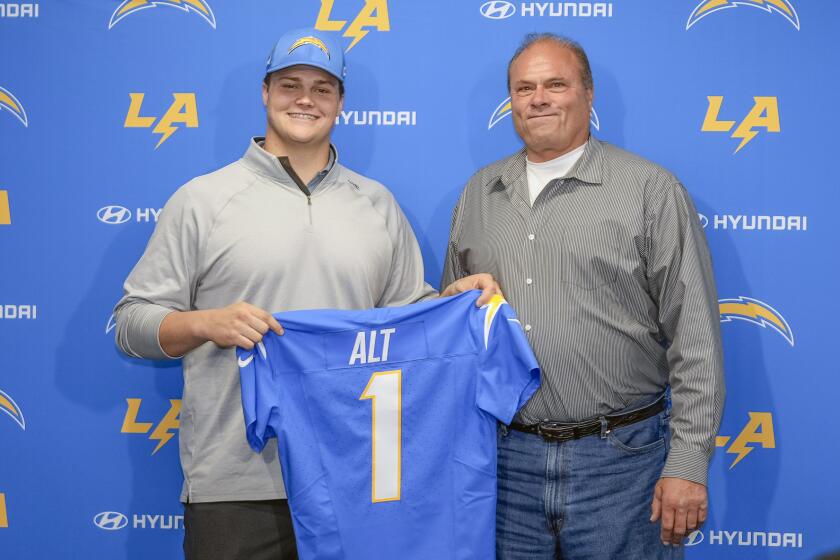Basketball Academy Is Studied
In a time of upheaval at all levels of basketball in the United States -- with NBA players failing to win gold medals in international competition, colleges losing students to the riches of the professional game and high school players feeling exploited during their developmental stages -- the governing bodies of the sport have decided to intervene in a rare display of unity.
After years of infighting and neglect, officials could be headed toward a groundbreaking compromise as they prepare to review a proposal for the creation of a national basketball academy for high school players and form a committee to study other areas of overlapping interest.
On Tuesday, NBA Commissioner David Stern and NCAA President Myles Brand issued a joint statement confirming a commitment to address growing concerns within the basketball community, particularly at the youth level, after holding discussions in Indianapolis with representatives from five other organizations.
“This is really something that is unusual and pretty far-reaching,” said NCAA spokesman Bob Williams, regarding the level of cooperation among basketball organizations.
According to a statement released by Stern and Brand, the group “identified a number of areas of common interest and have formed a working group that will study these issues in greater detail. We are exploring options for a broad-based inclusive structure to address the identified needs of youth basketball.”
Sonny Vaccaro, director of Reebok’s grass-roots basketball, spoke this month to representatives of the NBA, NCAA and USA Basketball about forming an academy that would train elite high school players in basketball and academics.
On Tuesday, representatives from those three groups as well as the Amateur Athletic Union, National Federation of State High School Assns., the National Assn. of Basketball Coaches and athletic apparel companies agreed to report back early next year with recommendations on possible courses of action.
Vaccaro said he would present a written plan to the organizations by next week. His proposal would be one of several initiatives that will be considered in the coming months.
The lack of a cohesive plan to develop national team players and the problems encountered by youth players who are not prepared socially or academically for the rigors of college and professional play have triggered the intervention.
Brand said last month it might be time for the NCAA to work with the NBA and shoe companies on ideas to better prepare high school athletes for college. The NCAA has received negative publicity after revelations that several prep schools have been acting as diploma mills and exploiting athletes.
Stern expressed concern during the NBA Finals in June, saying that “there is something out of whack that these world-class athletes get exploited and exposed all the way.”
USA Basketball is reeling from its team of NBA players’ losing this summer to Greece in the semifinals of the FIBA World Championship.
A unified front among the governing bodies could create the environment to provide powerful financial and institutional backing for a national basketball academy.
“Hopefully, someone can broker a peace treaty because it has to be done,” said Vaccaro, who envisions an academy similar to the successful IMG Bollettieri Tennis Academy, which opened in 1978. He said Los Angeles could be a potential site because of the availability of top academic institutions to which players could be sent for schooling when they aren’t training.
About 40 players from grades nine to 12 would be selected by a committee, Vaccaro said. Their scholarships for the academy could be taken away if they failed to meet academic standards. Retaining scholarships wouldn’t be tied to performance. Two teams would play a national schedule, and no postgraduate players would be involved.
The idea is not unique. IMG, a talent agency, has run six sports academies at a 190-acre complex in Bradenton, Fla., since 1987, focusing on tennis, soccer, golf, basketball, baseball and fishing.
Greg Folk, a starter for UCLA’s soccer team, left his high school in Southern California during his junior year to attend the soccer academy. He participated in an accelerated academic program, graduated a year early and received a college scholarship.
“I thought it was great being in an environment where you could play every day against top competition,” he said. “It was the top 40 players in the nation.”
However, athletes would be forgoing the high school experience, something Duke-bound basketball standout Taylor King of Santa Ana Mater Dei indicated he would be unwilling to relinquish.
“I want the experience of a real high school, with all the other students and faculty,” he said. “You only get to be a kid once.”
Greg Hilliard, boys’ basketball coach at North Hollywood Harvard-Westlake, who tutored twins Jason and Jarron Collins before they headed to Stanford and the NBA, said the idea could be a good one “when spelled out.”
“Maybe high school is no longer able to prepare somebody to go within a year or two into the professional world,” he said. “If a kid can get some help I can’t give him, I’m for that.”
More to Read
Get our high school sports newsletter
Prep Rally is devoted to the SoCal high school sports experience, bringing you scores, stories and a behind-the-scenes look at what makes prep sports so popular.
You may occasionally receive promotional content from the Los Angeles Times.
